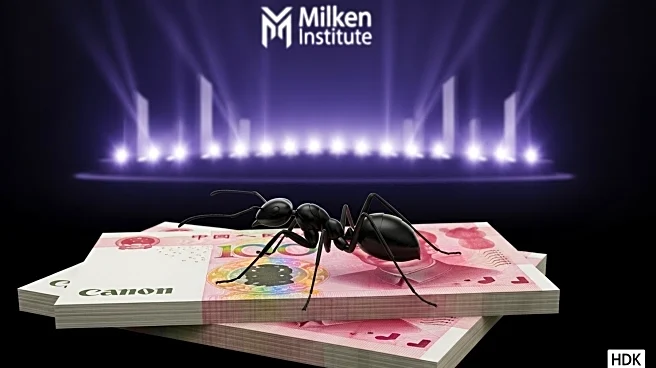What's Happening?
Black Ant Capital, a venture capital firm founded in 2016, has been making significant strides in China's consumer market. The firm has invested in notable companies such as Pop Mart, Laopu Gold, and BusyMing Group, which have shown remarkable growth. Pop Mart, known for its blind-box craze, has reached a market value of $44.2 billion, while Laopu Gold has seen its market capitalization soar to $15 billion. BusyMing is preparing for an IPO in Hong Kong. At the Milken Institute Asia Summit, David He, founding partner of Black Ant Capital, emphasized the evolving consumer landscape in China, noting the shift towards emotional fulfillment and cultural pride in consumer choices.
Why It's Important?
The investments by Black Ant Capital underscore the potential of China's consumer market, which remains vast despite recent economic challenges. The firm's success highlights the importance of understanding consumer trends, such as the demand for emotionally resonant products and homegrown luxury. These trends are crucial for brands aiming to expand internationally, particularly in the U.S. market. The firm's strategy also reflects broader shifts in consumer behavior, including increased spending power in lower-tier cities and a growing interest in self-care and emotional well-being.
What's Next?
Pop Mart and Laopu Gold are expected to continue their growth by deepening consumer engagement through new products and experiences. BusyMing's upcoming IPO could further enhance its market presence. Black Ant Capital plans to focus on consumer electronics, exploring how innovation can meet consumer demands. The firm anticipates more IPOs as exit strategies, while keeping an eye on industry consolidation and M&A opportunities.
Beyond the Headlines
The success of Black Ant Capital's investments highlights the cultural and emotional dimensions of consumer behavior in China. The firm's focus on products that offer emotional healing and resonate with cultural pride reflects broader societal trends, including the rise of feminism and national confidence. These factors could influence global consumer markets as Chinese brands expand internationally.









